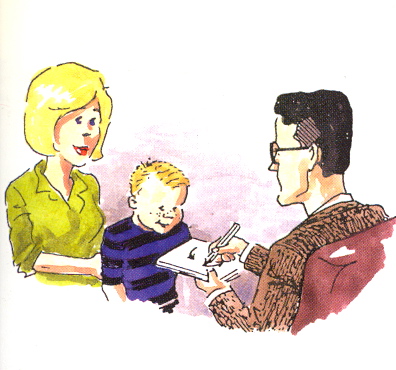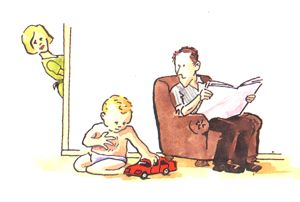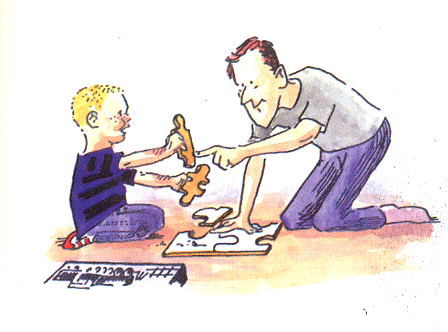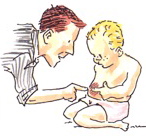Case Report: Mark Gets Better with The Combined Approach
The Combined Approach for Younger Children and Their Parents requires an adaptation of the programme to suit those involved. The following imaginary "case report", taken from clinical experience,has been written to illustrate what is involved. For further details see Younger Children.
 |
Mark is 2½ and lives with his older sister Jennie who is 4, and his Mum and Dad in a flat near the centre of town. He has had eczema since he was born, coming and going, but never clearing up. It disturbs everyone's sleep, and he spends a great deal of time rubbing and scratching, day and night. Mum has had eczema too, but Dad is OK and so is Jennie. Mum found a book called "The Eczema Solution" by Sue Armstrong-Brown and with the help of her doctor found using The Combined Approach described in the book really worked for her. So she has decided to use the same approach for Mark. The doctor explains it needs planning, but it would be worth doing. The Combined Approach is for atopic eczema that never seems to clear up properly with creams alone. It includes "habit reversal", a treatment to help with the habitual scratching that causes damage to the skin that will not heal with creams on their own.
The doctor explains the programme for Mark will have to involve everyone! A plan is needed, and first over a few days it is important to make three lists. One is of all the things that seem to make Mark's eczema worse: house dust, oranges, woollen clothes, and getting too hot all seem important, as does when he stays with his grandparents - perhaps the cat is the problem! The second list is things to do with Mark that he enjoys doing, and especially anything that keeps his hands busy! They list: playing with someone rather than being alone, sitting on a lap listening to stories being read aloud, drawing with crayons and doing his jigsaw puzzles, playing with play-dough and with his plastic building blocks.
 |
Finally, after watching Mark for a couple of days, Mum makes a list of all the times, situations, circumstances and activities that she can link with Mark's scratching - getting dressed and undressed, before he goes to sleep, while he is asleep, waiting in his chair before meals, sitting on his potty, watching TV, and being on his own playing with his toys - all these seem important.
The doctor gives them a booklet called "Living Without Eczema" - The Handbook for Younger Children and their Parents, which explains what needs to be done. It explains how the programme works - especially by replacing scratching with healing, but also how the moisturizers and steroid creams work, and how to use them correctly. Scratching for Mark is now as much a habit as caused by itch. Habits needed to be understood before they can be changed. The booklet explains how to do it all. The list of things that Mark likes doing is for everyone involved to refer to. It gives some ideas how to help Mark get his eczema healing, by leaving his skin alone for long enough. The doctor also makes sure Mum has the moisturizers they like best, and a good supply of correct steroid creams. He reviews with them how to use the creams, and especially says it is important to use the topical steroid for long enough: not to stop too soon.
As well as using the creams correctly, for the first few days everyone possible has to be available to help with the programme, taking it in turns. They decide to start on a Friday, so on Saturday and Sunday Dad will be there to help. Dad also arranges to be there on Monday too. Mark's Grandad and Granny will help, as will Mum's friend Sue, and their neighbour Carol. The idea is that for four days and nights Mark is to have someone with him all the time. Mum draws up a rota, and gives everyone a copy of the list of things to think about that will help keep Mark's hands off his healing skin.
 |
They all have to understand how important it is when changing behaviour to keep all interventions positive. When any attention is given directly to undesirable or negative behaviour, the effect can be the opposite of what is wanted: the undesirable can become re-inforced and then more likely to happen, as it is attracting attention. So it is very important never to say "Stop" or "Don't", but to focus always on encouraging Mark, diverting and distracting him with talk, & play. For three nights they take it in turns to stay awake through the night next to Mark as he sleeps, gently lifting him up and cuddling him every time he starts to scratch or rub his skin.
By the end of Monday Mark's skin is looking really great. He is definitely scratching so much less that everyone agrees he will now sleep OK again on his own, and from then onwards the "sentry duty" of the first four days is no longer necessary. The correct use of creams is the important thing now, and even though after another few days the skin looks as if it is healing really fast, or in some places has healed altogether, it is important to continue both moisturizers and topical steroids for a few weeks in total, to make sure the healing is through and through. How long this takes is worked out by seeing when it all looks healed: "the look good point", and then continuing the topical steroids for a week or so, to do what is called "hidden healing". Otherwise, all the other things that have helped during the first four days are important still, especially watching out for rubbing and scratching, and diverting and distracting again when necessary. Also now Mark gets lots of praise and attention for playing without rubbing and scratching. He is much happier now he was sleeping better, as is everyone of course!
When they go to see the doctor after four weeks all his eczema has been healed for a week. It is decided to reduce the frequency of the topical steroid to once a day for a few more days only, but continue with the moisturizer as needed: three times a day at present. The importance from now on of catching any eczema flare-up quickly is agreed. This treatment is called "Zapping The Relapse".
 |
Any dryness, redness, roughness or itch will now be given prompt extra steroid and moisturizer for a few days, exactly as it says in the booklet "Live Without Eczema". By referring back to the list of factors that seemed important in making Mark's eczema worse, it is possible to see how flare-ups can sometimes be predicted, and the quick "zap" treatment is easier to give. It is especially important to always have available the creams needed for zapping, even when the skin seems perfect, so that they are always ready for when a new flare-up happens. The doctor helps with this. With this follow up plan the skin settles further, with flare-ups getting less and less troublesome, bit by bit, as the next three months go by.
Everyone agrees following the programme has been well worth the effort. Now little Mark and his family enjoy living without eczema. They no longer have to live with it!
